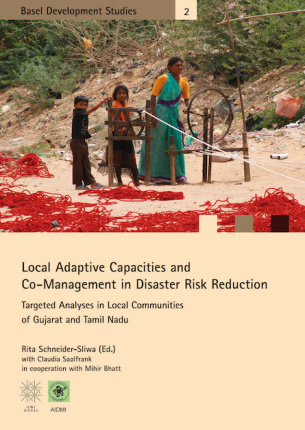
Herausgegeben von Prof. Dr. Rita Schneider-Sliwa, Dep. Umweltwissenschaften, Abt. Humangeographie der Univ. Basel
Vol. 2 Rita Schneider-Sliwa, Claudia Saalfrank (Hg.)
Mihir Bhatt
Local Adaptive Capacities and Co-Management in Disaster Risk Reduction
Targeted Analyses in Local Communities of Gujarat and Tamil Nadu
India is particularly challenged by a high disaster risk, due to its geo-climatic and socio-political constellation. Whether disasters, such as earthquakes, fl oods and droughts or community riots, are naturally, technologically and/or socio-politically induced, the consequences for low-income households is particularly hard felt. The studies presented in this volume address poverty reduction and risk management aspects related to such disasters in both urban and rural communities in India.
India has taken big steps to improve disaster risk management. Government and non-governmental agencies have been established and links to international disaster management resource networks made. There remains, however, a strong need to learn more about the strategies implemented by local communities to adapt to disasters in view of assisting their capacities to manage and mitigate the associated risks.
Particular emphasis is given herein to approaches of local communities and households to become involved in the co-management of disaster mitigation. The different sub-projects carried out in the states of Gujarat and Tamil Nadu, India, address questions pertaining to
livelihood security strategies in the informal sector of disaster affected areas
mitigation of disaster impact: effectiveness, problems and potentials of selected technical approaches and
microcredit impact and effectiveness in livelihood security.
This report, then, is about poor people, farmers, fi shermen and women and their livelihood strategies, how they secure resources, how knowledge is being used and how investments are being made in a common effort to sustain livelihoods. This report is also about local NGOs and their creativity, commitment and initiatives in coping with disaster.
The studies presented herein confi rm and encourage different kinds of community-based development cooperation but emphasise, nevertheless, the need for analysis of the local context before selection and application of supportive tools and methods.
Bevorstehende Veranstaltungen
Bibliographische Angaben
| Reihe | Basel Development Studies |
|---|---|
| Seitenanzahl | 165 arabisch, 4 römisch |
| Abbildungen | 29 s/w, 19 farbig |
| Tabellen | 13 |
| Zeichnungen | 13 |
| Format | 17 x 24 cm |
| Bindung | Buch, Broschiert |
| ISBN | 978-3-7965-2616-9 |
| Erscheinungsdatum | 01.01.2009 |